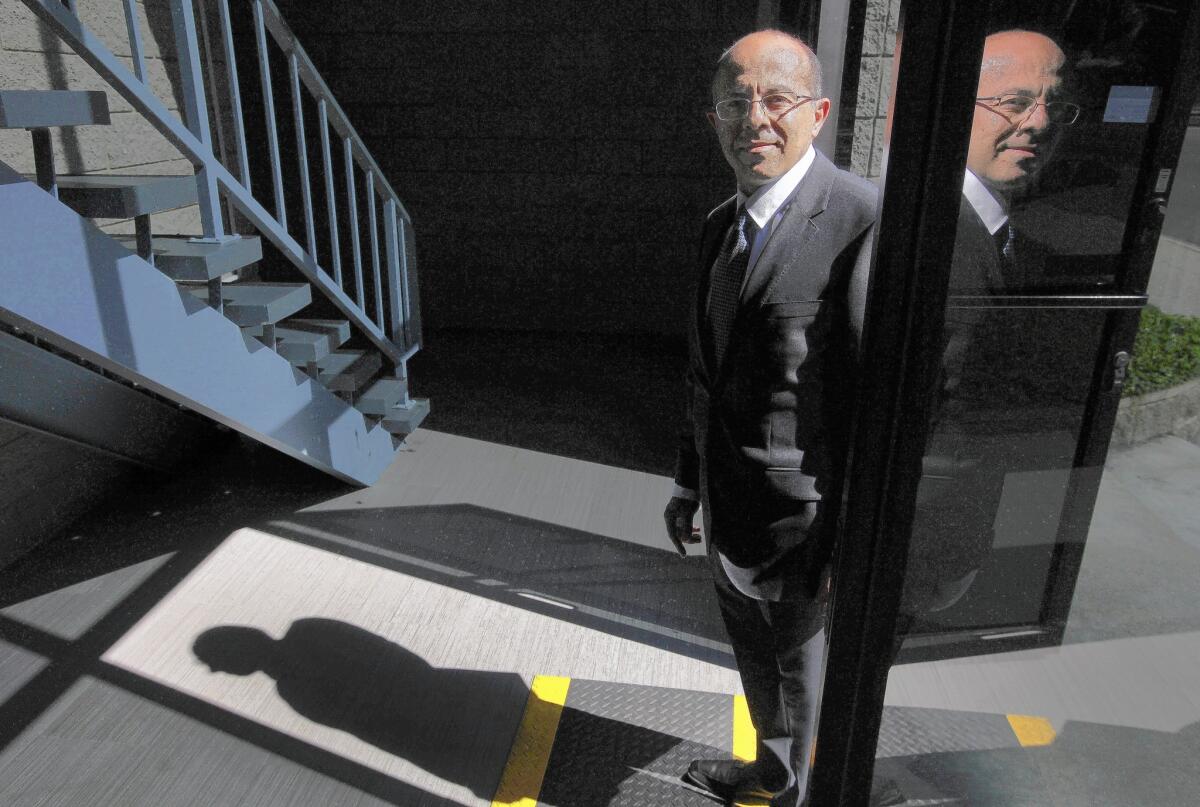Insurance agents played key role in California’s Obamacare enrollment

- Share via
As enrollment neared under the Affordable Care Act, both President Obama and California officials boasted that signing up for health insurance would be as easy as ordering a book from Amazon.com or buying a plane ticket online.
With that in mind, Covered California’s executive director, Peter Lee, predicted a bleak future for insurance agents selling individual policies, saying they could easily go the way of travel agents.
As it turns out, reports of their demise were greatly exaggerated. Insurance agents played a major role in California’s larger-than-expected enrollment of 1.4 million people in private health plans.
They personally signed up 525,000 Californians — nearly 40% of the state’s total, new data show. About the same number signed up on their own using the Covered California website.
“Agents deserve credit. They brought in big numbers,” said Betsy Imholz, special projects director at Consumers Union. “They are sort of the Rodney Dangerfield of the enrollment world.”
And agents did it without much help from the state-run exchange early on.
They were slowed by many of the same glitches on the Covered California website that flummoxed consumers. The exchange’s call center initially refused to help agents with customer applications, and clinics and nonprofit groups were discouraged from working with agents at enrollment events. State officials didn’t promote free, in-person assistance from agents until late in enrollment.
Covered California acknowledges that mistakes were made, and it’s conducting a comprehensive review of enrollment efforts so problems can be addressed going forward. But the state insists agents were never deliberately shunned.
“Any idea that we weren’t invested in agents on Day One is flat-out wrong,” Lee said. “Agents were embraced all along.”
Like many agents, Edmond Haronian said it didn’t feel that way.
Soon after enrollment began in October, the Canoga Park agent started calling the state’s service center to resolve issues with the website or his customer applications. First, it often took more than 30 minutes to get through. Then state workers refused to even take his call because they were instructed to only assist consumers.
Covered California said it reversed that policy in December and told call-center workers to help agents.
Meanwhile on his website, Haronian began touting his office as the alternative with “no wait time, no operator, in other words, no headaches like Covered California.” He hung a huge “Got Obamacare?” banner on his two-story building and he said he enrolled more than 1,000 people in the exchange.
“Originally Covered California was less than enthusiastic about agents. They wanted nothing to do with us,” Haronian said. “I honestly think agents saved the day.”
Lee, the head of Covered California, saluted the contributions of agents at a recent celebratory event in Sacramento and singled out top producers such as Haronian. A few days later, Lee surprised Haronian by calling to personally thank him and hear his ideas for improving enrollment.
Despite the government’s high hopes, signing up online proved far more challenging for many consumers. Agents were quick to step in to help, and many already had longtime customers who were switching to Obamacare policies. Agents were also accustomed to translating complex insurance jargon and hustling to find new customers in their community.
Many consumers also value their service after the sale, knowing they will have someone to call when problems arise in finding an in-network doctor or getting a medical bill paid by their insurer.
Highland Park resident Les Nakashima said turning to an agent sooner would have saved him a lot of time and trouble with Covered California. He ran into numerous problems in February trying to add his wife to the family’s exchange health plan.
“Getting through to Covered California was an absolute nightmare,” he said. “My agent could have done everything for me.”
Even with all the attention on the website, Covered California all along estimated about 80% of consumers would want personal help to sort through their new insurance options.
To help meet that demand, the state envisioned creating an army of 16,000 enrollment counselors at clinics, nonprofit organizations and community groups. But that ambitious plan soon hit roadblocks. Training sessions started late, background checks dragged on and some enrollment counselors who did get certified couldn’t log in to the state’s enrollment system.
In the first month of enrollment, Covered California had only about 600 enrollment counselors statewide. It finished the six-month open enrollment period in April with about 5,600 enrollment counselors. In contrast, more than 12,000 insurance agents got state certification so they could sell Covered California health plans.
Those delays with enrollment counselors had a ripple effect on the exchange’s marketing. It was hesitant to advertise free, in-person assistance until more counselors were available, and Lee said he didn’t want to just promote agents. The state’s advertising didn’t prominently mention counselors and agents until February.
“We didn’t want to put the thumb on the scale for one or the other,” Lee said. “Part of the reason we did not say go find an agent or counselor early on was because we were still certifying them. You could fault us for not doing that sooner.”
The exchange said that late start was the primary reason why enrollment counselors accounted for only 9% of sign-ups, or 116,000 people. The state’s call center handled another 9% of enrollment.
Consumer advocates had pushed for a large contingent of enrollment counselors, in part, because of long-standing concerns about agents steering people to certain health insurers.
Many consumers are unaware they don’t pay insurance agents for their help. Rather, agents receive commissions from health insurers. They get paid a flat fee or a percentage of the monthly premium.
Those industry commissions have been cut substantially in recent years. Blue Shield of California, for instance, pays agents a 4% commission on individual policies compared with 20% two years ago. Anthem Blue Cross switched to a flat fee of $18 per member per month for agents selling new policies.
Covered California paid enrollment counselors a flat amount of $58 for every successful application.
Some consumer groups worried that agents might favor certain insurers and not explain the full array of health plan options in Covered California. In Los Angeles, for instance, six different health insurers offered policies in the exchange at a variety of rates and with vastly different networks of hospitals and doctors.
“Agents might guide people to some plans based on what they’re paid in commissions,” Imholz of Consumers Union said, “rather than what might be the best choice for the person.”
Health-law supporters were also concerned that agents would cater primarily to their existing customers and wouldn’t do much to reach lower-income, uninsured residents who stood to benefit from premium subsidies and other aspects of the overhaul.
Insurance agents say they have every incentive to serve the customer’s best interest and hang on to that person as a longtime client.
“There’s an impression that agents must be in cahoots with insurance carriers and they are the bad guys,” said Michael Lujan, a former Covered California sales and marketing executive and now chief sales officer at Limelight Health in Redwood City. “Agents have been vilified unfairly.”
Based on an initial review, Lee said, it appears agents enrolled people at all income levels and reached many Latinos, a key group that accounts for about 60% of the state’s uninsured population. Lee said the exchange is still reviewing data for any indications that agents favored certain health plans or participated in inappropriate steering.
Looking ahead to the next open enrollment this fall, Lee said the exchange will be drawing on the expertise of agents even more.
“The people we are seeking to insure next year will be harder,” Lee said. “They will be less familiar with health insurance and they will need to sit across the table from an agent.”
[email protected]
Twitter: @chadterhune
More to Read
Inside the business of entertainment
The Wide Shot brings you news, analysis and insights on everything from streaming wars to production — and what it all means for the future.
You may occasionally receive promotional content from the Los Angeles Times.











